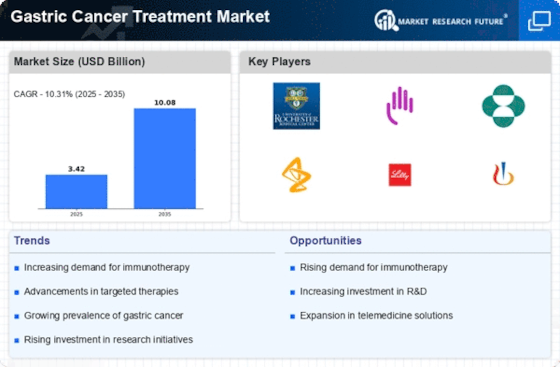Growing Incidence of Gastric Cancer
The rising incidence of gastric cancer is a primary driver for the Gastric Cancer Treatment Market. According to recent statistics, gastric cancer ranks as the fifth most common cancer worldwide, with an estimated 1 million new cases diagnosed annually. This alarming trend is attributed to various factors, including dietary habits, smoking, and infection with Helicobacter pylori. As the prevalence of this disease escalates, there is an increasing demand for effective treatment options, which propels the growth of the Gastric Cancer Treatment Market. Healthcare providers are compelled to invest in innovative therapies and treatment modalities to address this urgent health concern, thereby expanding the market landscape.
Advancements in Treatment Modalities
Innovations in treatment modalities are significantly influencing the Gastric Cancer Treatment Market. The introduction of novel therapies, such as targeted therapies and immunotherapies, has transformed the treatment landscape. For instance, the approval of drugs like trastuzumab and pembrolizumab has provided new avenues for patient management. These advancements not only enhance treatment efficacy but also improve patient outcomes, leading to a growing interest from pharmaceutical companies in developing new agents. The market is projected to witness substantial growth, with an estimated CAGR of 7.5% over the next five years, driven by these advancements in treatment options within the Gastric Cancer Treatment Market.
Aging Population and Lifestyle Changes
The aging population and associated lifestyle changes are significant contributors to the Gastric Cancer Treatment Market. As the global population ages, the incidence of gastric cancer is likely to rise, given that age is a major risk factor for the disease. Additionally, lifestyle changes, such as increased consumption of processed foods and sedentary behavior, are further exacerbating the situation. This demographic shift is prompting healthcare systems to adapt and expand their treatment offerings. Consequently, the Gastric Cancer Treatment Market is poised for growth, as healthcare providers seek to address the needs of an aging population with tailored treatment solutions.
Growing Awareness and Screening Programs
The growing awareness of gastric cancer and the implementation of screening programs are vital drivers for the Gastric Cancer Treatment Market. Public health campaigns aimed at educating populations about the risk factors and symptoms of gastric cancer have led to earlier detection and diagnosis. Countries are increasingly adopting screening programs, particularly in high-risk populations, which has resulted in a higher number of diagnosed cases. This proactive approach not only facilitates timely treatment but also contributes to the overall growth of the Gastric Cancer Treatment Market. As awareness continues to rise, the demand for effective treatment options is expected to increase correspondingly.
Increased Research and Development Investments
The surge in research and development investments is a crucial factor propelling the Gastric Cancer Treatment Market. Pharmaceutical companies and research institutions are increasingly allocating resources to discover and develop novel therapeutic agents. This trend is evidenced by the rising number of clinical trials focused on gastric cancer treatments, which have increased by approximately 20% in the past two years. Such investments not only foster innovation but also enhance the understanding of gastric cancer biology, leading to the development of more effective treatment strategies. As a result, the Gastric Cancer Treatment Market is likely to experience accelerated growth, driven by these R&D initiatives.

















Leave a Comment